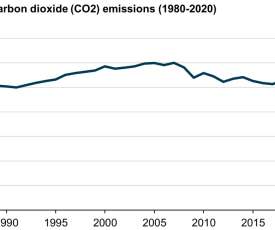EIA: US energy-related CO2 emissions down 1.7% in 2016; carbon intensity of economy down 3.1%; transportation emissions up
Green Car Congress
OCTOBER 6, 2017
decline in energy intensity of the economy (Btu/GDP). Combining these two factors, the overall carbon intensity of the economy (CO 2 /GDP) declined by 3.1%. Among the findings of the EIA analysis: CO 2 emissions form natural gas surpassed those from coal in 2016. along with a 1.4%








































Let's personalize your content